| Listing 1 - 9 of 9 |
Sort by
|
Image
Year: 1571 Publisher: Antwerp Christoffel Plantijn and Mynken Liefrinck
Abstract | Keywords | Export | Availability | Bookmark
 Loading...
Loading...Choose an application
- Reference Manager
- EndNote
- RefWorks (Direct export to RefWorks)
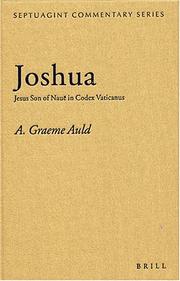
ISBN: 1280859520 9786610859528 1433706024 1429426993 9781429426992 9781433706028 9789004138421 9004138420 9004138420 9789004138421 Year: 2005 Publisher: Leiden Boston Brill
Abstract | Keywords | Export | Availability | Bookmark
 Loading...
Loading...Choose an application
- Reference Manager
- EndNote
- RefWorks (Direct export to RefWorks)
The earliest complete witness (in Greek) to the Old Testament book of Joshua is transcribed with facing English translation. The following commentary explores the dynamics of the Greek text while keeping an eye on how it relates to the Hebrew.
Book
ISBN: 3110168642 9783110168648 Year: 2000 Volume: 297 Publisher: Berlin de Gruyter
Abstract | Keywords | Export | Availability | Bookmark
 Loading...
Loading...Choose an application
- Reference Manager
- EndNote
- RefWorks (Direct export to RefWorks)
Bible OT. Historical books. Kings 1-2 --- Bible OT. Historical books. Samuel 1-2 --- Bible OT. Historical books. Joshua --- 222.4 --- Deuteronomium --- Bible. O.T. Joshua, 1 --- Criticism, interpretation, etc --- Bible. O.T. Joshua, 23-24 --- Bible. O.T. Samuel I, 12 --- Bible. O.T. Kings, 1st, 8 --- Bible. O.T. Deuteronomy
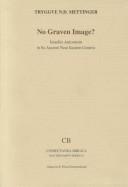
ISBN: 9122016589 9789122016588 Year: 1995 Volume: 40 Publisher: Stockholm Almquist & Wiksell International
Abstract | Keywords | Export | Availability | Bookmark
 Loading...
Loading...Choose an application
- Reference Manager
- EndNote
- RefWorks (Direct export to RefWorks)
Analyse du discours narratif --- Discours narratif -- Analyse --- Discourse analysis [Narrative ] --- Narratieve teksten -- Tekstgrammatica --- Narrative discourse analysis --- Teksten [Narratieve ] -- Tekstgrammatica --- Teksten [Verhalende ] -- Tekstgrammatica --- Textes narratifs -- Analyse du discours --- Verhalende teksten -- Tekstgrammatica --- 222.5 --- Jozua. Rechters. Ruth --- Bible. O.T. Joshua --- Criticism, interpretation, etc
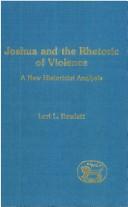
ISBN: 1850756279 9781850756279 Year: 1996 Volume: 226 Publisher: Sheffield Sheffield academic press
Abstract | Keywords | Export | Availability | Bookmark
 Loading...
Loading...Choose an application
- Reference Manager
- EndNote
- RefWorks (Direct export to RefWorks)
Joshua and the Rhetoric of Violence' examines the book of Joshua as a construction of national identity. This pioneering New Historicist analysis shows how the Deuteronomist used war oracle language and epic historical lore to negotiate sociopolitical boundaries. It asserts that text and context interacted in a programme consolidating King Josiah's authority in the wake of Assyrian imperial collapse. The book argues that the conquest narrative is not simple 'us against them' propaganda but a complex web of negotiations defining identity and otherness. The analysis draws on Foucault's principle
War --- Violence in the Bible. --- Biblical teaching. --- Bible. O.T. Joshua I, 1-9 -- Criticism, interpretation, etc. --- War -- Biblical teaching. --- Violence in the Bible --- Judaism --- Religion --- Philosophy & Religion --- Biblical teaching --- 222.5 --- -Armed conflict (War) --- Conflict, Armed (War) --- Fighting --- Hostilities --- Wars --- International relations --- Military art and science --- Peace --- Jozua. Rechters. Ruth --- -Jozua. Rechters. Ruth --- Bible. --- Criticism, interpretation, etc. --- War - Biblical teaching.
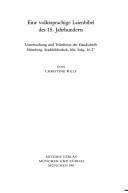
ISBN: 3760833985 Year: 1992 Publisher: Tübingen Max Niemeyer Verlag
Abstract | Keywords | Export | Availability | Bookmark
 Loading...
Loading...Choose an application
- Reference Manager
- EndNote
- RefWorks (Direct export to RefWorks)
091:22 --- 091:22 Bijbels--(handschriften) --- Bijbels--(handschriften) --- Nuremberg. Stadtbibliothek. Manuscrit. Solg. 16.2° --- Nürenberg. Stadtbibliothek. Handschrift. Solg. 16.2° --- Nürnberg. Stadtbibliothek. Manuscript. Solg. 16.2° --- Bible. O.T. Joshua. German (Middle High German) --- Criticism, interpretation, etc --- Manuscripts --- Bible. O.T. Judges. German (Middle High German) --- Bible. O.T. Ruth. German (Middle high German)
Book
ISBN: 9789042925922 9042925922 Year: 2011 Volume: *11 Publisher: Leuven Peeters
Abstract | Keywords | Export | Availability | Bookmark
 Loading...
Loading...Choose an application
- Reference Manager
- EndNote
- RefWorks (Direct export to RefWorks)
Bible OT. Historical books. Joshua --- Bible. --- Bible. A.T. Josué --- 222.5 --- Jozua. Rechters. Ruth --- Bible. O.T. Joshua --- Commentaries --- Jesus Nave (Book of the Old Testament) --- Joshua (Book of the Old Testament) --- Josua (Book of the Old Testament) --- Josué (Book of the Old Testament) --- Jozua (Book of the Old Testament) --- Sifr Yashūʻ (Book of the Old Testament) --- Yashūʻ (Book of the Old Testament) --- Yehoshuʻa (Book of the Old Testament)
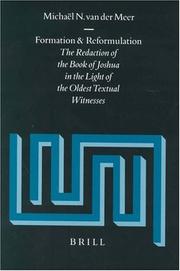
ISBN: 9004131256 9047412923 9789004131255 Year: 2004 Volume: 102 Publisher: Leiden : E.J. Brill,
Abstract | Keywords | Export | Availability | Bookmark
 Loading...
Loading...Choose an application
- Reference Manager
- EndNote
- RefWorks (Direct export to RefWorks)
This volume offers a critical examination of recent theories concerning the growth of biblical literature in the light of the oldest textual witnesses (the Qumran biblical scrolls and the Septuagint). On the basis of a fresh examination of a selection of passages in the book of Joshua, it is shown that these witnesses do not reflect a stage in the literary formation of the book prior to the standardised (Masoretic) text, but a reinterpretation and reformulation of its contents. The study presents a new literary-critical solution to the intricate problems of Joshua 8 and a detailed exegesis of the Greek version of Joshua 1 and 5. Of special interest for Qumran scholars is the new reconstruction of 4QJoshuaª.
Bible. --- Criticism, Redaction. --- Criticism, Textual. --- 222.5 --- Jozua. Rechters. Ruth --- Theses --- Jesus Nave (Book of the Old Testament) --- Joshua (Book of the Old Testament) --- Josua (Book of the Old Testament) --- Josué (Book of the Old Testament) --- Jozua (Book of the Old Testament) --- Sifr Yashūʻ (Book of the Old Testament) --- Yashūʻ (Book of the Old Testament) --- Yehoshuʻa (Book of the Old Testament) --- Bible. O.T. Joshua --- Criticism [Redaction ] --- Criticism [Textual ]
Book
ISBN: 1575066742 9781575066745 9781575062433 1575062437 Year: 2012 Publisher: Winona Lake, Ind. Eisenbrauns
Abstract | Keywords | Export | Availability | Bookmark
 Loading...
Loading...Choose an application
- Reference Manager
- EndNote
- RefWorks (Direct export to RefWorks)
In Josh 8:30-35, Israel constructs an altar on Mt. Ebal in fulfillment of the command of Deut 27:1-8. This structure had very important social, political, and religious implications for Israel, for it was the first structure to be built after the people entered the land of Canaan. Once the altar was completed, sacrifices were to be offered on it, and a renewal of the covenant was to be carried out (patterned after the ritual of Deut 31:9-13). This covenant renewal was necessary to integrate the people into the covenant who had not been a part of the Sinai experience. The event was significant enough to establish nearby Shechem as the tribal league shrine, and it was the first political and religious ceremony that the Israelites undertook following their entry into the land. As a covenant ratification, it could be described as their ratification as a nation. The altar on Mt. Ebal and its concomitant ceremony were, therefore, according to the claims of the Hebrew Bible, of supreme importance in the life of ancient Israel.In 1980, during the survey of the territory of Manasseh, Israeli archaeologist Adam Zertal discovered a site on Mt. Ebal dating to the period of Iron I, during which the Israelites began to sedentarize in the central hill country of Canaan. The site was excavated over eight seasons, from 1982 to 1989, under the auspices of the University of Haifa and the Israel Exploration Society. In 1985, Zertal published an article in which he suggested that the structure on Ebal may have been the altar of Josh 8:30-35.In The Iron Age I Structure on Mt. Ebal, Ralph Hawkins reviews the excavation on Mt. Ebal and its results, including the scarabs, seals, and animal bones found there. He examines the architecture of the site in relation to Mesopotamian watchtowers, altars, and the descriptions of altars in mishnaic materials, Ezekiel, and Deuteronomic passages.This fascinating book examines the Mt. Ebal site using a comparative method for both the physical data and the textual data. The site and its artifacts are analyzed and then compared with alternative proposals and literary traditions. The site is placed in its broader regional context in order to determine how it might relate to the larger settlement picture of Iron Age I. The primary purpose is to examine the data with a view to determining the nature and function of the site and its possible relation to Josh 8:30-35. A compelling read for biblical and archaeological students and scholars, who will better be able to envision sites of past events.
Excavations (Archaeology) --- Iron age --- Civilization --- Archaeological digs --- Archaeological excavations --- Digs (Archaeology) --- Excavation sites (Archaeology) --- Ruins --- Sites, Excavation (Archaeology) --- Archaeology --- Bible. --- Jesus Nave (Book of the Old Testament) --- Joshua (Book of the Old Testament) --- Josua (Book of the Old Testament) --- Josué (Book of the Old Testament) --- Jozua (Book of the Old Testament) --- Sifr Yashūʻ (Book of the Old Testament) --- Yashūʻ (Book of the Old Testament) --- Yehoshuʻa (Book of the Old Testament) --- Antico Testamento --- Hebrew Bible --- Hebrew Scriptures --- Kitve-ḳodesh --- Miḳra --- Old Testament --- Palaia Diathēkē --- Pentateuch, Prophets, and Hagiographa --- Sean-Tiomna --- Stary Testament --- Tanakh --- Tawrāt --- Torah, Neviʼim, Ketuvim --- Torah, Neviʼim u-Khetuvim --- Velho Testamento --- Antiquities. --- Criticism, interpretation, etc. --- Ebal, Mount (West Bank) --- West Bank --- ʻAskar, Gʾabal (West Bank) --- ʻAybāl, Jabal (West Bank) --- ʻEval, Har (West Bank) --- Gʾabal ʻAskar (West Bank) --- Har ʻEval (West Bank) --- Har ha-Ḳelalah (West Bank) --- Jabal ʻAybāl (West Bank) --- Ḳelalah, Har ha- (West Bank) --- Mount Ebal (West Bank) --- Ebal, Mount. --- Bible. -- O.T. -- Joshua -- Criticism, interpretation, etc. --- Bible. -- O.T. -- Antiquities.
| Listing 1 - 9 of 9 |
Sort by
|

 Search
Search Feedback
Feedback About UniCat
About UniCat  Help
Help News
News